Glam metal is a subgenre of heavy metal that features pop-influenced hooks and guitar riffs, upbeat rock anthems, and slow power ballads. It borrows heavily from the fashion and image of 1970s glam rock.

T.S.O.L. is an American punk rock band formed in 1978 in Long Beach, California. Although most commonly associated with hardcore punk, T.S.O.L.'s music has varied on each release, including such styles as deathrock, art punk, horror punk, other varieties of punk music, and hard rock.

Jack Grisham is an American rock singer from Southern California. He is the vocalist for the punk rock band T.S.O.L., which emerged from the late 1970s Los Angeles hardcore punk rock scene, along with Black Flag, Circle Jerks and Bad Religion. Grisham has also fronted the bands Vicious Circle, the Joykiller, Tender Fury and Cathedral of Tears. He records with T.S.O.L., the Joykiller and the Manic Low.
Ronald Emory is an American rock musician and guitarist for the punk rock band T.S.O.L.. An original member of the band, founded in Southern California in 1979, Emory left in 1987 prior to the release of the album Hit and Run. In 1996, he joined the other original members of T.S.O.L. to reform the band, which remains active. Emory worked on a solo project titled Walk That Walk, which was released on April 15, 2010.

Dance with Me is the first full-length album by the American hardcore punk band T.S.O.L., released in 1981 though Frontier Records. While the band's eponymously titled debut EP, released earlier that year, had been filled with radical leftist lyrics, Dance with Me moved away from politics in favor of horror film- and gothic-inspired subject matter. The album includes T.S.O.L.'s most well-known song, the necrophilia-themed "Code Blue". Following the punk rock revival of the 1990s, Dance with Me was re-released by Epitaph Records in 1996 and by Nitro Records in 2007.
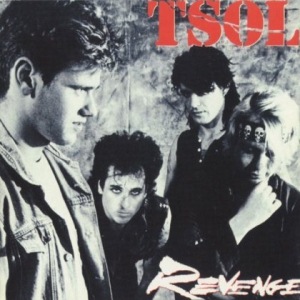
Revenge is the fourth studio album by the American rock band T.S.O.L., released in 1986 through Enigma Records. With increased exposure brought on by continuous touring, and influenced by the growing hard rock scene in their native Southern California, the band moved away from the punk- and gothic rock-influenced sound of their past in favor of simpler rock numbers. To promote the album, two songs were used in film soundtracks: "Nothin' for You" in The Return of the Living Dead (1985) and "Revenge" in Dangerously Close (1986). "Revenge" and "Colors " were also made into the band's first music videos.
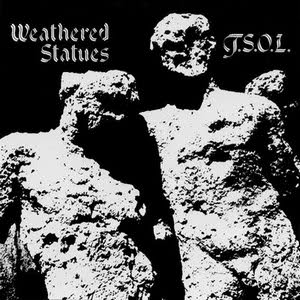
Weathered Statues is an EP by the American hardcore punk band T.S.O.L., released in 1982 through Alternative Tentacles. In comparison to the band's previous material, its experimental nature and melodic leanings confused some of their fans and presaged the creative direction they would take on their second studio album, 1983's Beneath the Shadows. The material from Weathered Statues was later re-released on the compilation albums Thoughts of Yesterday: 1981–1982 (1987) and T.S.O.L. / Weathered Statues (1997).

Beneath the Shadows is the second studio album by the American hardcore punk band T.S.O.L., released in 1983 through Alternative Tentacles. With the addition of keyboardist Greg Kuehn to the lineup, the band moved away from punk rock in favor of a gothic rock sound in the vein of later releases by the Damned and Siouxsie and the Banshees songs, alienating much of their hardcore audience in the process. Though the album was critically well received and led to the band being featured in director Penelope Spheeris' film Suburbia, it was largely rejected by their fanbase within the punk scene.

Change Today? is the third studio album by the American rock band T.S.O.L., released in 1984 through Enigma Records. It was the band's first album with singer/guitarist Joe Wood and drummer Mitch Dean, replacing founding members Jack Grisham and Todd Barnes who had left the band in late 1983. The album was recorded using money loaned to T.S.O.L. by the Dead Kennedys, and found the new incarnation of the band moving away from the hardcore punk associations of the original lineup in favor of a traditional rock and gothic rock sound. Change Today? was reissued in 1999 through the Enigma subsidiary Restless Records, adding four tracks from the recording sessions that had been left off the original album.

The discography of T.S.O.L., an American punk rock band, consists of eleven studio albums, three live albums, three compilation albums, two EPs, two video albums, three singles, and five music videos.

T.S.O.L. is the eponymously titled debut EP by the American hardcore punk band T.S.O.L., released in 1981 through Posh Boy Records. Its fast tempos and politically radical lyrics established the band as a major force in the southern California hardcore scene of the time. T.S.O.L. quickly moved away from leftist political subject matter, however, shifting in a gothic rock direction and changing labels to Frontier Records for their full-length album Dance with Me (1981). This led to a dispute with Posh Boy owner Robbie Fields, who claimed the band owed his label another EP. The two parties eventually reached a settlement in which Posh Boy gained the rights to T.S.O.L.'s 1982 EP Weathered Statues, combining it with the debut EP in the 1987 compilation album Thoughts of Yesterday: 1981–1982. Nitro Records purchased the master recordings from Posh Boy in 1997 and re-released the two EPs as the compilation T.S.O.L. / Weathered Statues.
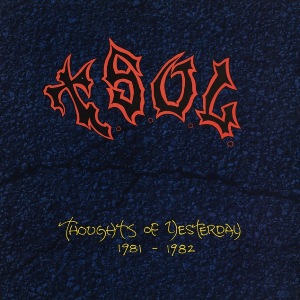
Thoughts of Yesterday: 1981–1982 is a compilation album of early material by the American hardcore punk band T.S.O.L., released in 1987 by Posh Boy Records. It combines the band's two EPs, 1981's T.S.O.L. and 1982's Weathered Statues, as well as an early version of "Peace Thru' Power", a song that was re-recorded for their first full-length album Dance with Me (1981). The album's release stemmed from a dispute between T.S.O.L. and Posh Boy owner Robbie Fields that began when the band left Posh Boy after releasing T.S.O.L., moving to Frontier Records for Dance with Me. Fields maintained that the band owed his label another EP, and withheld royalties from them as a result. The dispute culminated in singer Jack Grisham punching Fields in the face. Several years later, after Grisham and drummer Todd Barnes had both left T.S.O.L., a settlement was negotiated in which the band members received back royalty payments and Posh Boy acquired the rights to Weathered Statues, originally released through Alternative Tentacles. Posh Boy combined the two EPs to create Thoughts of Yesterday.

Live is a live album by the American rock band T.S.O.L., recorded January 17, 1988 at The Coach House in San Juan Capistrano, California and released later that year through Restless Records. It includes performances of songs from the band's three prior studio albums—Change Today? (1984), Revenge (1986), and Hit and Run (1987)—as well as two cover songs, one of The Doors' "Roadhouse Blues" and one of Bob Dylan's "All Along the Watchtower". Founding guitarist Ron Emory left the band after this album, leaving bassist Mike Roche as the only remaining original member.
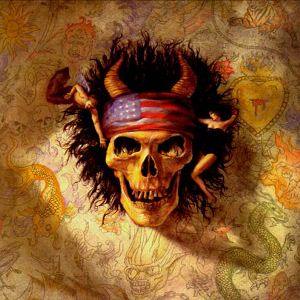
Strange Love is the sixth studio album by the American rock band T.S.O.L., released in 1990 through Enigma Records. It was the band's final studio album to include singer/guitarist Joe Wood and drummer Mitch Dean, and the only one to include guitarist Marshall Rohner. Bassist and sole remaining original member Mike Roche left the group after the recording of Strange Love, reuniting with the rest of the original lineup in 1991. Wood and Dean carried on for a few more years with other members, but Strange Love was a commercial disappointment and the band was eventually dropped from Enigma. In 1999 founding members Roche, Jack Grisham, Ron Emory, and Todd Barnes would win back legal rights to the name "T.S.O.L." from Wood and relaunch the band, taking it back to its punk rock roots.

Live '91 is a live album by the American hardcore punk band T.S.O.L., released in 1991 through Triple X Records. It marked a reunion of the band's original lineup of singer Jack Grisham, guitarist Ron Emory, bassist Mike Roche, and drummer Todd Barnes. At the time, the rights to the name "T.S.O.L." were held by Joe Wood and Mitch Dean, who had replaced Grisham and Barnes in 1984 and taken the band in a glam metal direction. Wood legally prevented the original members from using the name for their reunion, so they were billed by their four full names and Live '91 does not carry the name T.S.O.L. on its packaging.

Hell and Back Together: 1984–1990 is a compilation album by the American rock band T.S.O.L., released in 1992 through Restless Records. It includes material from the band's hard rock/glam metal era with singer/guitarist Joe Wood and drummer Mitch Dean, which saw lineup changes resulting in the departure of original members Ron Emory and Mike Roche. It compiles tracks from the albums Revenge (1986), Hit and Run (1987), and Strange Love (1990), two tracks from other compilations, and three songs recorded live for radio station WBCN in Boston. It was the final album released by this incarnation of T.S.O.L.; in 1999 the original lineup of Emory, Roche, Jack Grisham, and Todd Barnes reacquired legal rights to the band's name and relaunched the group with a return to its hardcore punk roots.
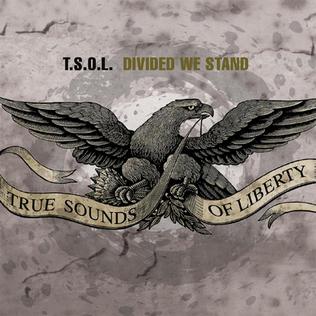
Divided We Stand is a studio album by the American hardcore punk band T.S.O.L. It was released in 2003 through Nitro Records.
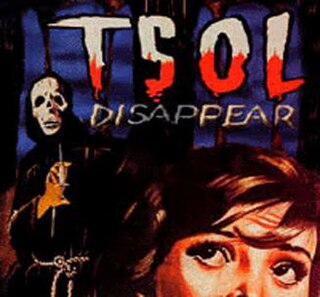
Disappear is a studio album by the American hardcore punk band T.S.O.L., released in 2001 through Nitro Records.

Live from Long Beach is a live album by the American hardcore punk band T.S.O.L., released in 2008 through Cider City Records.
Joe Wood is a Punk, Blues singer/songwriter, best known as the singer for T.S.O.L. from 1983 to 1993.
















